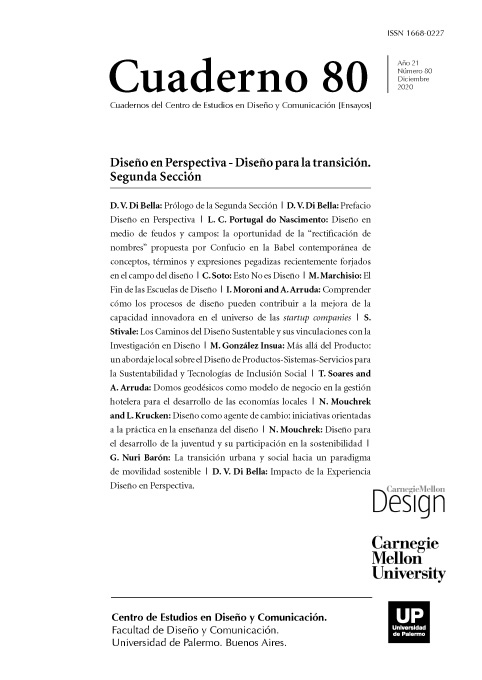El fin de las Escuelas de Diseño
Abstract
Augé raises, “what we know of the world will change the world” but in our days these changes are unimaginable; we can´t know, for example, what will be the degree of progress of science in thirty years. The fact of assuming the role of design facing the future, announces new purposes that can only be tackled from another paradigm different from the modern rational one. The relations installed from this logic, especially in education, used categories such as pairing, massification and uniformization that ended up provoking functional behaviors to the dominant capital and consumption system.
The aim plays with ambivalence: term or purpose. This duality that seems to lend itself to two interpretations actually complement each other. If we think from the logic of the systems and their interactions, from the perspective of the paradigm as a time budget, we verified that each one of them installed certain purposes, which made the human cultural systems solve the operations of interaction between man as a species and its support; thus, the rest of the material and living systems of the universe are conditioned by them. The aim as goal has a scope that is achieved or not. Whatever the result,(...) Could we assume the hypothesis of the end of the purposes of the dominant rational paradigm? Faced with the challenges and goals of avant-garde pedagogy, Will it not be time to test other purposes of Being in the World? And if so, Which is the role of education and the environments that propitiate it, make it possible, enhance it and complement it? Or will it actually be that the educational spaces that currently hold these functions condition it and limit it? Have current schools become places of impossibility?
References
Augé, M. (2015). ¿Qué paso con la confianza en el futuro? Buenos Aires: Siglo XXI ediciones.
Bauman, Z. (2005). Vida líquida. Barcelona: Paidos, Serie Estado y Sociedad, 143.
Badiou, A. (2012). Elogio del amor. Buenos Aires: Editorial Paidós.
Benjamin, W. (2011). Libro de los pasajes. Madrid: Editorial Akal.
Castells, M. (2006). La sociedad red: una visión global. Madrid: Alianza Editorial.
Borges, J. L. (2009). El instante. Poesía completa. Barcelona: Editorial Destino.
Chomsky, N. (2015). La (des)educación. Barcelona: Colección Austral. García Duttmann, A. (1991). Eliminación de las huellas. Quaderns nº 221.
Han, Byun-Chul (2015). La Salvación de lo bello. Buenos Aires: Herder.
Harari Yuval, N. (2016). De animales a dioses, Breve historia de la humanidad. Buenos Aires: Debate Ediciones.
Pesci, R.; Pérez, J. y Pesci, L. (2002). De la prepotencia a la levedad: FLACAM, paradigma y pedagogía de la sustentabilidad: 72-81. La Plata: CEPA-FLACAM
Serres, M. (1995). Atlas. Barcelona: Colección Teorema.
Los autores/as que publiquen en esta revista ceden los derechos de autor y de publicación a "Cuadernos del Centro de Estudios de Diseño y Comunicación", Aceptando el registro de su trabajo bajo una licencia de atribución de Creative Commons, que permite a terceros utilizar lo publicado siempre que de el crédito pertinente a los autores y a esta revista.


